For the distribution of pronouns into the syntactic (and semantic) nouns and adjectives, see Section 2, "Semantic parts of speech". In the following, we are giving the rules for determining whether the following pronouns are syntactic nouns, or adjectives: ten (=this) (ta, to), takový (=such), který (=which), jaký (=what/which) and possessive pronouns.
The pronoun"ten". The pronoun ten (ta, to) is either a syntactic noun, or adjective; following the rules:
-
"ten" as a syntactic noun.
Ten is considered a syntactic noun in the following positions:
-
"ten" standing on its own.
If the pronoun ten is used on its own (without a governing noun) and alternates with the pronouns on / onen it is considered a syntactic noun. The alternation with on is more natural with animate forms but, in principle, the rule holds for inanimate forms as well.
The node for ten is assigned a functor according to its position in the sentence.
Examples:
Mluvil jsem s kolegy a ti.
ACTmají stejný názor. [sempos=n.pron.def.demon] (=I talked to my colleagues and they (lit. those) share my view) Fig. 8.1Byl jsem u náměstka a ten.
ACTod nás nic požaduje. [sempos=n.pron.def.demon] (=I went to see the deputy and he (lit. that) wants nothing from us)Potkal jsem vašeho syna. Ten.
ACTvypadal smutně. [sempos=n.pron.def.demon] (=I met your son. He (lit. that) looked so sad)Znám vaše rodiče. Ti.
ACTmají pěkný domek. [sempos=n.pron.def.demon] (=I know your parents. They (lit. those) have a nice house)Koupil dědečkovi nové pantofle. Ty.
ACTvypadaly pěkně. [sempos=n.pron.def.demon] (=He bought his granddad new slippers. They (lit. those) looked very nice)Ze stolu spadl ten.
ACT, který byl na kraji. [sempos=n.pron.def.demon] (=The one (lit. that) that was situated by the edge of the table fell down)Těm.
ADDR, kteří nepřišli, nedám zápočet. [sempos=n.pron.def.demon] (=Those who didn't come won't get the credit)Poskytněte pomoc těm.
ADDR, kteří to potřebují. [sempos=n.pron.def.demon] (=Help those who need it)Stavby se odlišovaly od těch.
PAT, u jejichž zrodu stála avantgarda. [sempos=n.pron.def.demon] (=The buildings were different from those built in the avant-garde era) -
"ten" + adjective.
If the pronoun ten precedes an adjective (that is not nominalized; see Section 1.1, "Nominalized adjectives"), it is considered a syntactic noun.
The node representing the adjective has the
RSTRfunctor and depends on the node for the pronoun ten.Examples:
První úloha je snadná, ta.
ACTdruhá.RSTRje obtížná. [sempos=n.pron.def.demon] (=The first task is easy, the second (one) is difficult) Fig. 8.2Ty modré pantofle jsou hezčí než ty.
ACTzelené.RSTR. Nejhezčí jsou ale ty.ACTčervené.RSTR[sempos=n.pron.def.demon] (=The blue slippers are nicer than the green (ones). But the red (ones) are the nicest)Rovnal knihy na poličku: dozadu dával ty.
PATvázané.RSTR, dopředu ty.PATlepené.RSTR[sempos=n.pron.def.demon] (=He was arranging the books in the shelf: he placed the hardback ones at the back and the softback ones at the front)Vezmi si s sebou jen to.
PATnejnutnější.RSTR[sempos=n.pron.def.demon] (=Take just the most important stuff with you)
-
-
"ten" as a syntactic adjective.
The pronoun ten is considered a syntactic adjective in the following position:
-
"ten" + noun.
If the pronoun ten precedes a syntactic noun (i.e. also a nominalized adjective, numeral or pronoun), it is considered a syntactic adjective.
The node representing ten has the
RSTRfunctor and depends on the node for the following noun.Examples:
Poskytl pomoc těm.
RSTRPolkám.ADDR, které to potřebovaly. [sempos=adj.pron.def.demon] (=He helped those Polish women who needed that) Fig. 8.3Chceme splnit sny těm.
RSTRdruhým.ADDR[sempos=adj.pron.def.demon] (=We want to fulfil other people's dream) Fig. 8.4Ti.
RSTRtvoji rodiče.ACTmají pěkný domek. [sempos=adj.pron.def.demon] (=Your parents (lit. those your parents) have a nice house)Ty.
RSTRmodré pantofle.ACTjsou hezké.[sempos=adj.pron.def.demon] (=The blue slippers are nice)Do nemocnice přijali jen toho.
RSTRraněného.PAT[sempos=adj.pron.def.demon] (=They only accepted the injured one in the hospital)Ti.
RSTRdva.ACTjsou líní. [sempos=adj.pron.def.demon] (=Those two are lazy)Ti.
RSTRvšichni.ACTtu chtějí zůstat. [sempos=adj.pron.def.demon] (=All these people want to stay)
-
For coreference with the pronoun ten see Section 3, "Textual coreference" and Section 5.2.3, "No (textual) coreference with the pronoun "ten" used as a noun".
For ten as a supporting expression see Section 5.3.1, "Correlative pairs with the supporting expression "ten"".
Figure 8.1. "Ten" as a syntactic noun
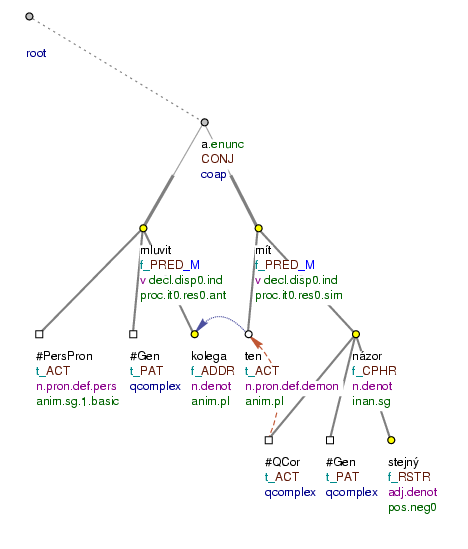
Mluvil jsem s kolegy a ti mají stejný názor. (=lit. (I) talked AUX with colleagues and those have same opinion)
Figure 8.2. "Ten" as a syntactic noun
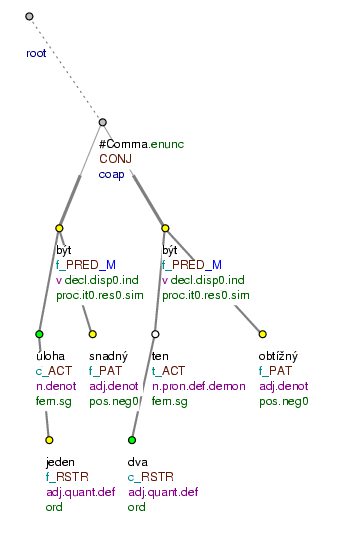
První úloha je snadná, ta druhá je obtížná. (=lit. First task is easy, that second is difficult)
Figure 8.3. "Ten" as a syntactic adjective
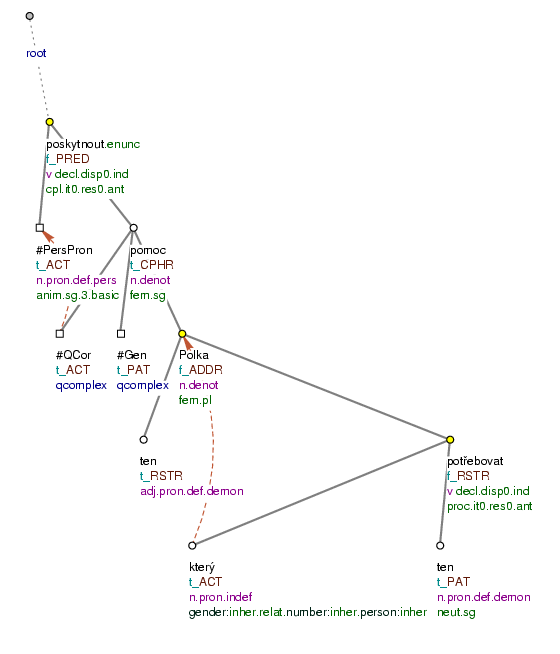
Poskytl pomoc těm Polkám, které to potřebovaly. (=lit. (He) provided help to_those Polish_women which it needed)
Figure 8.4. "Ten" as a syntactic adjective
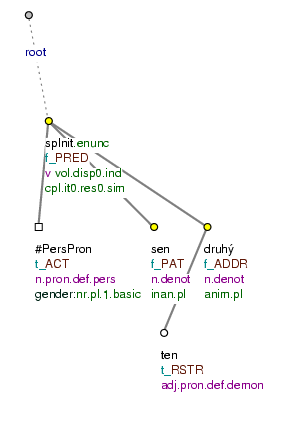
Chceme splnit sny těm druhým. (=lit. (We) want to_fulfil dreams to_those others)
The pronoun "takový". As for the pronoun takový that is standing on its own in the sentence (without a potential governing noun), it is considered a syntactic noun or adjective on the basis of the particular meaning and context.
Cf.:
-
Jsou tací.
ACT, kteří rádi hladovějí.RSTR(=There are such (people) who like to starve)The pronoun takový is considered a syntactic noun here.
-
Máme hodně věcí, ale <takové>{věc.
PAT}, které potřebujeme.RSTR, nemáme. (=We've got a lot of things but those that we need we haven't got)Takový is considered a syntactic adjective here. In this case, there is ellipsis (of the governing noun) involved in the sentence (see Section 12.1.2, "Ellipsis of the governing noun").
If the pronoun takový precedes a syntactic noun (i.e. also a nominalized adjective, numeral or pronoun), it is considered a syntactic adjective.
For takový as a supporting expression see Section 5.3.2, "Correlative pairs with the supporting expression "takový"".
!!! The sempos attribute of takový is always adj.pron.def.demon. So far, the distinction semantic nouns vs. adjectives has not been carried out. See also Section 6.2.2, "Definite pronominal semantic adjectives: demonstratives".
The relative pronouns "který" and "jaký". The relative pronouns který and jaký are considered syntactic (and semantic) nouns, or adjectives depending on whether they introduce relative, or content clauses (see Section 5.2, "Content vs. relative clauses"; Section 6.1.4, "Indefinite pronominal semantic nouns" and Section 6.2.3, "Indefinite pronominal semantic adjectives"):
-
"který" and "jaký" as syntactic nouns.
If který or jaký stands for a noun modified by the dependent (relative) clause, it is a syntactic (and semantic) nouns.
The node representing který or jaký is assigned a functor according to the type of dependency it has w.r.t. the governing node.
Examples:
Karel dostal knihu, jakou/kterou.
PATsi přál.RSTR[sempos=n.pron.indef] (=Karel got the book (which) he wanted) Fig. 8.5Přidělili nám vedoucího, který/jaký.
ACTse jim hodil.RSTR[sempos=n.pron.indef] (=They assigned us a boss that was convenient for them) Fig. 8.6Vedoucí, jakého/kterého.
PATnám přiděli.RSTR, nestojí za nic. [sempos=n.pron.indef] (=The boss (which) they have assigned us is not any good) Fig. 8.7Informace, která.
ACTje.RSTRnejdůležitější, nesmí být zapomenuta. [sempos=n.pron.indef] (=The information that is the most important mustn't be forgotten) -
"který" and "jaký" as syntactic adjectives.
In constructions in which the pronouns který or jaký introduce a content clause the pronouns který a jaký are regarded as syntactic (and semantic) adjectives.
The node for který or jaký depends on its governing noun and has the
RSTRfunctor. If the governing noun is not present in the surface structure, the ellipsis is going to be represented according to the rules in Section 12.1.2, "Ellipsis of the governing noun".Examples:
Otázka, jakou/kterou.
RSTRknihu.PATsi přejete.PAT, nezazněla. [sempos=adj.pron.indef] (=The question which book you wish was not asked) Fig. 8.8(Přeje si knihu.) Vím, kterou/jakou.
RSTR{ knihu.PAT} si přeje.PAT[sempos=adj.pron.indef] (=(He wants a book) I know which one) Fig. 8.9Informace, která.
RSTR{#EmpNoun.ACT} je.PATnejdůležitější, nesmí být zapomenuta. [sempos=adj.pron.indef] (=The information which one is the most important mustn't be forgotten)
NB! Constructions with the pronoun jaký in the nominal part of a verbonominal predicate are analyzed differently.
The pronoun jaký is considered a syntactic (and semantic) adjective here (although it is introducing a relative clause). No node (for a governing noun) is inserted into the structure in constructions with verbonominal predicates.
Example:
Trh prostě počítá s člověkem, jaký.PAT opravdu je. [sempos=adj.pron.indef] (=The market takes into account people as (lit. which) they really are) Fig. 8.10
The interrogative pronouns "který" and "jaký". The interrogative pronouns který and jaký are taken to be syntactic (and hence semantic) adjectives.
The node for který or jaký depends on its governing noun and has the RSTR functor. If the governing noun is not present in the surface structure, the ellipsis is going to be represented according to the rules inSection 12.1.2, "Ellipsis of the governing noun".
Examples:
(Přál bych si obrázek.) A který.RSTR { obrázek.PAT} si přeješ? [sempos=adj.pron.indef] (=(I would like a picture) And which one would you like?) Fig. 8.11
Jaký.RSTR si přeješ obrázek? [sempos=adj.pron.indef] (=What picture would you like?)
Který.RSTR obrázek jsi dostal? [sempos=adj.pron.indef] (=Which picture did you get?)
Figure 8.5. "Který" as a syntactic noun
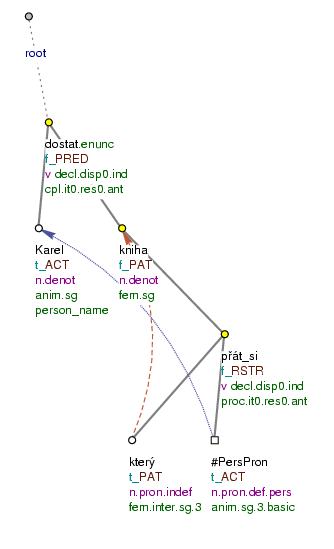
Karel dostal knihu, kterou si přál. (=lit. Karel got book which REFL (he) wished)
Figure 8.6. "Jaký" as a syntactic noun
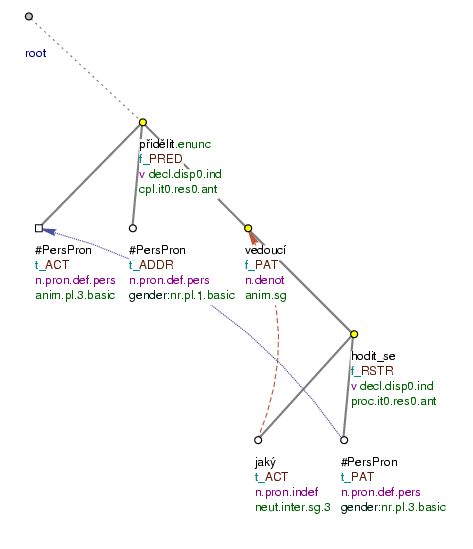
Přidělili nám vedoucího, jaký se jim hodil. (=lit. (They) assigned us boss which REFL to_them was_convenient)
Figure 8.7. "Jaký" as a syntactic noun
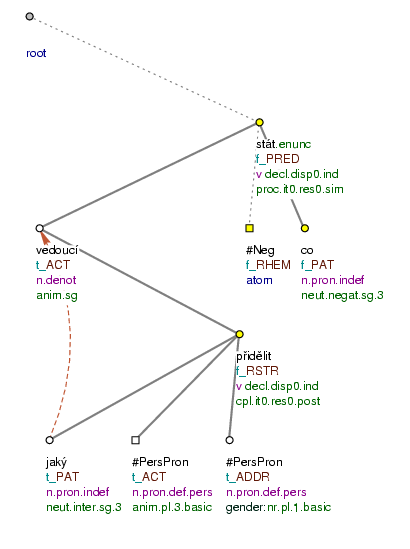
Vedoucí, jakého nám přidělí, nestojí za nic. (=lit. Boss which (they) us will_assign is_not_worth for nothing)
Figure 8.8. "Jaký" as a syntactic adjective
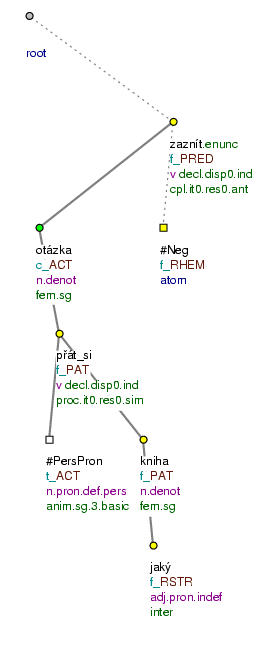
Otázka, jakou knihu si přeje, nezazněla. (=lit. Question which book REFL (he) wishes was_not_asked)
Figure 8.9. "Který" as a syntactic adjective
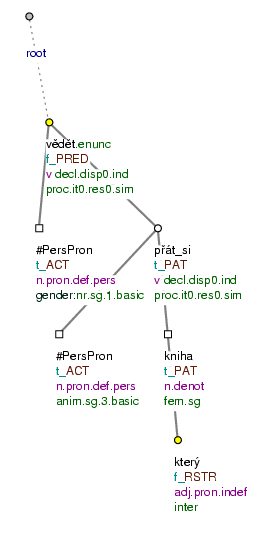
(Přeje si knihu.) Vím, kterou si přeje. (=lit. ((He) wishes REFL book) (I) know which REFL (he) wishes)
Figure 8.10. "Jaký" as a syntactic adjective
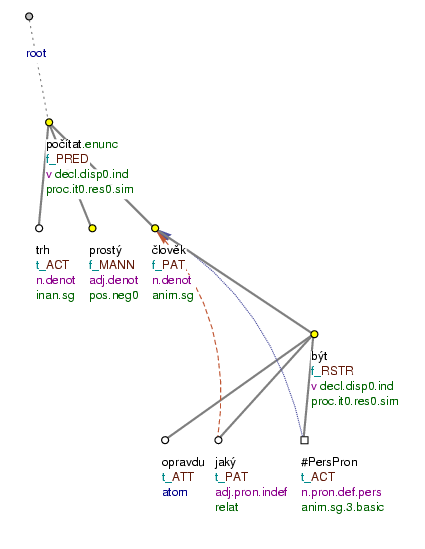
Trh prostě počítá s člověkem, jaký opravdu je. (=lit. Market simply counts with man what (he) really is)
Figure 8.11. "Který" as a syntactic adjective
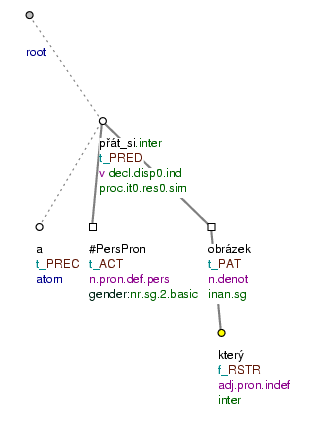
(Přál bych si obrázek.) A který si přeješ? (=lit. ((I) would_like - REFL picture) And which REFL (you) wish?)
Possessive pronouns. Possessive pronouns are always considered syntactic adjectives except for the cases like Pojedeme k našim. (=We'll visit our parents (lit. ours)) or Jak se mají vaši? (=How are your parents (lit. yours)?), where naši and vaši play the role of syntactic nouns.